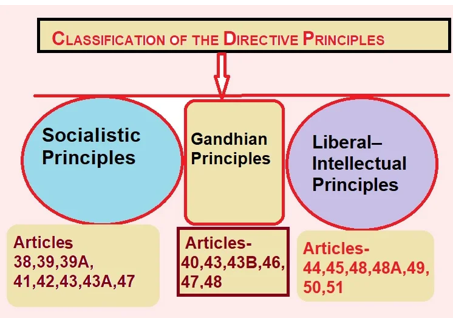Part IV: Directive Principles of State Policy (Articles 36 to 51)
Overview
- Directive Principles are guidelines for the central and state governments of India to be kept in mind while framing laws and policies.
- These are non-justiciable, meaning they cannot be enforced in a court of law, but they are fundamental to the governance of the country.
- Inspired mainly by the Irish Constitution, also influenced by Gandhian philosophy, socialist principles, and liberal ideas.

List of Articles in Part IV (36–51)
Article 36 – Definition
- Defines “State”: It has the same meaning as in Part III (which includes the executive, legislature, local bodies, etc.).
Article 37 – Application of the Principles
- States that these principles are not enforceable by courts.
- But they are nevertheless fundamental in the governance of the country.
- The State must apply these principles in making laws.

Article 38 – State to secure a social order for the promotion of welfare of the people
- (1) The State shall strive to promote the welfare of the people by securing and protecting a social order based on justice—social, economic, and political.
- (2) Added by 44th Amendment (1978): State shall minimize inequalities in income, status, facilities, and opportunities.
Article 39 – Certain principles of policy to be followed by the State
The State shall direct its policy towards securing:
- Equal right to an adequate means of livelihood.
- Distribution of material resources to subserve the common good.
- Prevention of concentration of wealth and means of production.
- Equal pay for equal work for both men and women.
- Protection of children and youth against exploitation and against moral and material abandonment.
- Health and strength of workers, and that childhood and youth are not abused.
Article 39(b) and 39(c) were invoked in the Kesavananda Bharati case (1973) to uphold constitutional amendments affecting property rights.
Article 39A – Equal justice and free legal aid
- Added by 42nd Amendment (1976).
- Provides for free legal aid to ensure equal justice, especially for the poor and weaker sections.
Article 40 – Organisation of village panchayats
- The State shall take steps to organize village panchayats and endow them with powers to function as units of self-government.
Article 41 – Right to work, education, and public assistance
- Within its economic capacity, the State shall secure:
- Right to work
- Right to education
- Public assistance in cases of unemployment, old age, sickness, and disablement.
Article 42 – Just and humane conditions of work and maternity relief
- Promotes humane working conditions and maternity benefits for women.
Article 43 – Living wage, etc., for workers
- Secure a living wage and decent standard of life for all workers.
- Encouragement of cottage industries in rural areas.
Article 43A – Participation of workers in management of industries
- Added by 42nd Amendment (1976).
- Encourages worker participation in industrial management.
Article 44 – Uniform Civil Code (UCC)
- The State shall endeavor to secure a Uniform Civil Code for all citizens across India.
- Very controversial and often debated.
- UCC aims to replace personal laws (Hindu, Muslim, Christian laws) with a common set governing marriage, divorce, inheritance, etc.
Article 45 – Early childhood care and education
- Originally aimed to provide free and compulsory education to children up to age 14.
- After the 86th Amendment (2002), it now promotes early childhood care and pre-primary education to children below 6 years.
Article 46 – Promotion of educational and economic interests of SCs, STs, and other weaker sections
- Special promotion of education and economic interests of Scheduled Castes (SCs), Scheduled Tribes (STs), and other weaker sections.
Article 47 – Duty of the State to raise the level of nutrition and standard of living and to improve public health
- Includes banning intoxicating drinks and drugs, except for medicinal purposes.
Article 48 – Organisation of agriculture and animal husbandry
- Scientific improvements in agriculture and animal husbandry.
- Prohibits slaughter of cows and calves and other milch and draught cattle — a source of debate and state laws.
Article 48A – Protection and improvement of environment and safeguarding forests and wildlife
- Added by 42nd Amendment (1976).
- The State shall protect the environment, forests, and wildlife.
Article 49 – Protection of monuments and places of national importance
- State must protect monuments, places, and objects of artistic or historic interest.
Article 50 – Separation of judiciary from executive
- Especially in the lower judiciary to maintain independence of the judiciary.
Article 51 – Promotion of international peace and security
- Promote international peace, respect for international law, and encourage settlement of international disputes by arbitration.
Interesting Facts
- Inspired by Ireland: The idea of DPSPs came from the Irish Constitution (1937).
- Moral obligation: Though not enforceable, courts often refer to them to interpret laws and in judgments (e.g., Kesavananda Bharati, Minerva Mills).
- DPSP vs. Fundamental Rights: If there’s a conflict, Fundamental Rights prevail — but efforts are made to harmonize both.
- Some DPSPs later became Fundamental Rights:
- Right to Education (Art. 21A) in 2002 was earlier under Article 45.
- 42nd Amendment (1976) gave a big boost to DPSPs:
- Added Articles 39A, 43A, and 48A.
- In 2015, the Law Commission under Justice A.P. Shah recommended implementing the Uniform Civil Code.
Summary
Feature | Directive Principles (Part IV) |
Articles Covered | 36 to 51 |
Enforceable in Court? | ❌ No |
Inspired by | Irish Constitution |
Amendments Impacting DPSP | 42nd, 44th, 86th Amendments |
Key Areas Covered | Social justice, legal aid, Panchayati Raj, UCC, environment, education, workers’ rights, public health, etc. |


